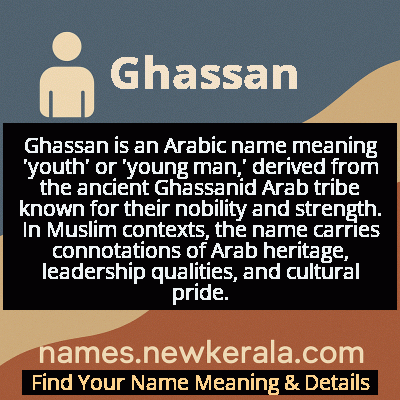Ghassan Name Meaning & Details
Origin, Popularity, Numerology Analysis & Name Meaning of Ghassan
Discover the origin, meaning, and cultural significance of the name GHASSAN. Delve into its historical roots and explore the lasting impact it has had on communities and traditions.
Name
Ghassan
Gender
Male
Origin
Muslim
Lucky Number
6
Meaning of the Name - Ghassan
Ghassan is an Arabic name meaning 'youth' or 'young man,' derived from the ancient Ghassanid Arab tribe known for their nobility and strength. In Muslim contexts, the name carries connotations of Arab heritage, leadership qualities, and cultural pride.
Ghassan - Complete Numerology Analysis
Your Numerology Number
Based on Pythagorean Numerology System
Ruling Planet
Venus
Positive Nature
Harmonious, responsible, caring, and artistic.
Negative Traits
Overly idealistic, superficial, possessive, or jealous.
Lucky Colours
Pink, turquoise.
Lucky Days
Friday.
Lucky Stones
Diamond, turquoise.
Harmony Numbers
2, 3, 9.
Best Suited Professions
Artists, musicians, teachers, healthcare workers.
What People Like About You
Warmth, nurturing nature, artistic flair.
Famous People Named Ghassan
Ghassan Kanafani
Writer and Political Activist
Influential Palestinian novelist and political leader
Ghassan Tueni
Journalist and Politician
Prominent Lebanese journalist and diplomat
Ghassan Salame
Academic and Diplomat
UN Special Representative and political scientist
Ghassan Massoud
Actor
Internationally recognized Syrian actor
Name Variations & International Equivalents
Click on blue names to explore their detailed meanings. Gray names with will be available soon.
Cultural & Historical Significance
In Islamic contexts, the name gained additional significance as many Ghassanids embraced Islam and contributed substantially to early Islamic scholarship, governance, and military leadership. The name symbolizes the continuity of Arab identity across religious and historical transitions, representing both pre-Islamic Arab heritage and Islamic civilization. Throughout centuries, Ghassan has remained a name associated with educated elites, political leaders, and cultural figures across the Arab world, particularly in regions with historical Ghassanid presence like Syria, Lebanon, Jordan, and Palestine. The name embodies the idea of Arab cultural resilience and the ability to maintain distinctive identity while engaging with broader civilizations.
Extended Personality Analysis
Individuals named Ghassan are typically characterized by a strong sense of identity, deep cultural awareness, and natural leadership qualities. They often possess a commanding presence combined with intellectual depth, making them effective in positions of authority and influence. Ghassans tend to be principled individuals who value honor, loyalty, and tradition while maintaining the flexibility to adapt to changing circumstances. Their personality often reflects a balance between strength and sensitivity, allowing them to be both decisive leaders and empathetic companions. Many display a natural elegance in their demeanor and communication style, often serving as cultural ambassadors or bridge-builders between different groups.
In social contexts, Ghassans are known for their diplomatic skills, emotional intelligence, and ability to navigate complex relationships with grace. They typically exhibit strong family values and community orientation, seeing themselves as custodians of heritage and tradition. While grounded in their roots, they often demonstrate progressive thinking and openness to new ideas, creating a unique blend of traditional wisdom and contemporary vision. The historical legacy of the Ghassanid kings seems to echo in their personality - combining warrior spirit with cultural refinement, strategic acumen with artistic sensibility, and personal ambition with collective responsibility. These traits make them particularly effective in fields requiring cultural sensitivity, strategic leadership, and the ability to honor tradition while embracing innovation.
Modern Usage & Popularity
In contemporary usage, Ghassan maintains respectable popularity across the Arab world, particularly in Lebanon, Syria, Jordan, and Palestine where historical connections to the Ghassanid heritage remain strong. The name enjoys steady but selective usage, often chosen by families who value historical significance and cultural prestige without seeking overly common names. While historically more prevalent among Christian Arab communities due to the Ghassanids' Christian heritage, the name has been widely adopted across Muslim communities who appreciate its deep Arab roots and noble connotations. In Western diaspora communities, Ghassan serves as a distinctive name that powerfully connects children to Arab heritage while being easily pronounceable in international contexts. The name's usage patterns reflect a balance between traditional appeal and modern adaptability, with many contemporary bearers excelling in academia, business, arts, and public service while maintaining strong cultural identity.
Symbolic & Spiritual Meanings
Symbolically, Ghassan represents the enduring strength of cultural heritage, the wisdom that comes from historical continuity, and the noble responsibility of leadership. The name evokes the metaphorical image of an ancient tree with deep roots and expansive branches - grounded in tradition while reaching toward the future. It symbolizes the bridge between civilizations, much like the historical Ghassanids who connected Byzantine and Arab cultures, representing the idea that cultural identity can be preserved while engaging constructively with other civilizations. Ghassan also carries connotations of protective strength - not aggressive dominance but rather the strength that safeguards community, preserves tradition, and nurtures growth. Metaphorically, the name suggests the combination of youthful vitality with ancestral wisdom, representing the ideal of carrying forward the best of the past while contributing meaningfully to the present and future.

